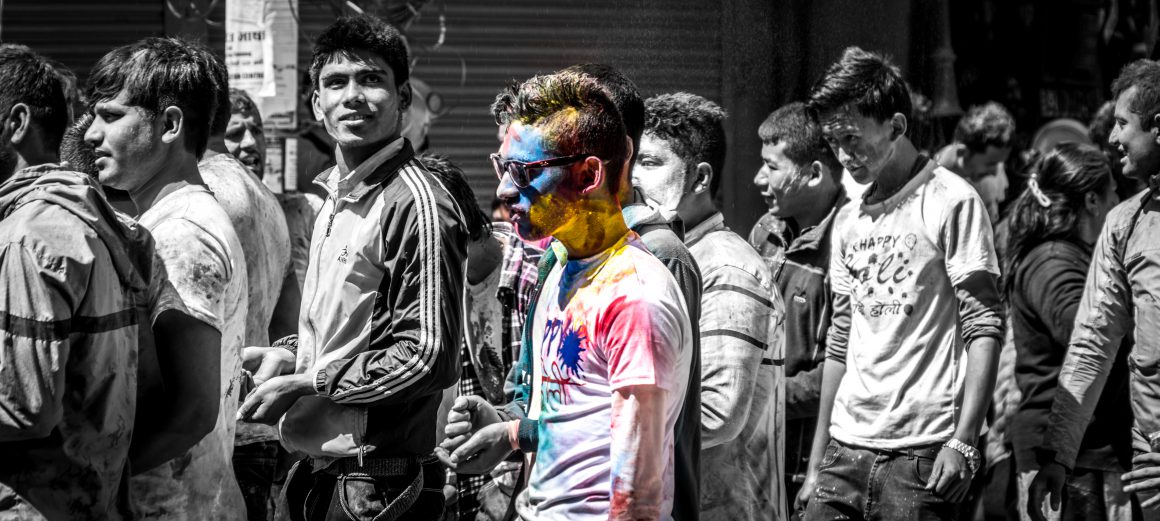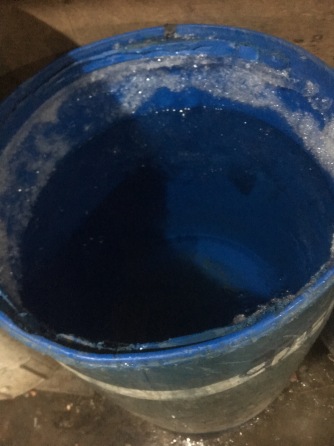…CONTINUED
My energy reserves had, in all respects, met their bottom. I laid motionless on top of the snow with my heavy breathing as the only indication that I was still alive—I was okay but needed time before I could start moving again. My breathing remained cumbersome and short for many moments (up to this point, it only took a few seconds, 15 at the most, before my breathing normalized, allowing me to start trekking again). This time was different; I spent what felt like a lifetime on the ground, gasping for air. For the sake of my toes, I knew that I needed to get up and keep moving, but my lungs were tight, and my muscles had been heavily strained.
I groped the snow around me, there was a lot of it, before coming to my grips. My toes felt life inside of them from the blast of effort I had put forth getting up the ridge, but as the seconds passed, so did their returning life. But I couldn’t get up, not just yet; I needed more time to recover. Even if I wanted to, I wouldn’t have been able to stand for long as I was exhausted beyond repair.
I spent the next few moments breathing short, quick breaths into the snow until the ice crystals began to melt around my face. I didn’t bother moving, not until my breath and energy returned. As they did, I took my opportunity and depleted both of them, once more, getting back on my feet. My pack was heavy, heavier than I had ever felt it before. Just getting it around my shoulders was more work than the small act of getting back onto my feet. Upon standing, my head spun, and black spots clouded my vision. I leaned onto my trekking poles to prevent myself from falling back into the snow. Another few moments passed before my vision cleared up and the sensation of collapsing retreated.
THE TEAHOUSE
For the first time, I looked around unbothered by time or people. The landscape was beautiful and rich with life. Snow coated the ground around me, painting a bold layer between sky and ground while spiraling rock chasms reached far below into the valley. All around me, sheer rock walls rose to the heavens, towering confidently over me; I was over 5,000 meters in the air, but they rose over six. In the grand scheme of the landscape, I was a but a mere ant, leaving tiny footprints as I tracked over the snow.
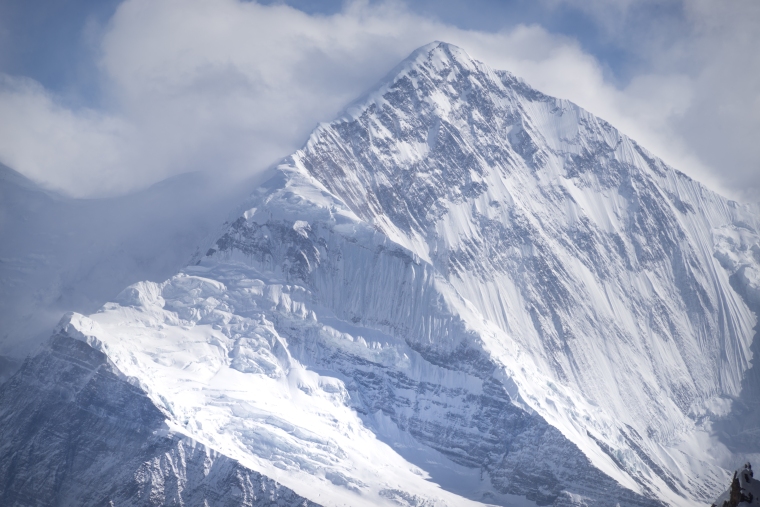


As my eyes followed the various marks and lines that formed the landscape and waited for my strength to return, I made out a small stone hut that erected almost in line with the snow banks which had crept up and nearly swallowed it whole. The only reason I was able to make it out from the rest of the white, rocky, landscape, was because the snow had recently fallen from a part of its roof. Its tin roof, painted blue, glimmered under the sun and contrasted brightly against the snow. It was the psychological halfway mark—but just shy of the actual halfway point. The small glimpse restored my hope and gave me the motivation that I needed to continue forward. I knew that only one thing mattered, putting the heat back into my toes and reversing any damage that had already taken its hold.
I unstrapped my pack, letting it fall where it would, as I entered a small hole in the rocks that was the door. It was dark and cramped inside—a table took up a large portion of the open floor—but it shielded against the wind and retained the warmth from a small crackling fire that roared in the corner. The light flickered against the smooth, defined stones that rose up the walls; it reached as far as it could before failing and falling just shy of the opening in the rocks, there it met the light of the sun and the coolness of the snow.
“What’ll you be having?” the caretaker mumbled as he appeared from out of the shadows. The warm light revealed many wrinkles that hung folded into one another from his face. He was old, worn by time and many seasons, but there he stood, hunched in front of me, wise and sure. I was surprised to see somebody caring for the teahouse and found myself startled. “A…, a black tea, please,” I stammered back.
I dropped to the bench as I removed my shoes and socks (they were soaking wet and had already crystallized, making them stiff like rubber bands: old, worn, and ready to crumble). The caretaker watched over me with a wandering eye as I placed the hot, tin cup between my feet and toes. Immediate pleasure came over me. I could see and feel my toes curl around the cup and watched as blood rushed through my veins. The veins pulsed from under my skin.

The caretaker stood by silently before lifting my shoes from the ground. He examined them for a while and finally came out with it: “These no good,” he remarked, as he held up the shoe to my sight.
“I know,” I responded in a long annoying tone like I hadn’t come to the realization myself. But the caretaker was kind and took nicely to my tone. He disappeared for a second before returning with two plastic bags. I looked at him curiously, thinking of what the bags were for.“These will keep the heat in and the water out,” he said as he extended his hands forward. I smiled and instantly regretted the arrogant and annoyed remark that I had made moments earlier. The two, tattered plastic bags came at a great cost, but at that point, money was of no value to me, and I handed over every wet, crumpled bill that lined the bottom of my pocket.
THE FINAL ASCENT
I remained within the warmth of the teahouse for only a few minutes; I needed to reach the Pass before powerful currents sent harsh winds up and over the Pass from the Mustang Region, giving me only another hour or so.
When I could feel life come back into my toes, I set off. The Bear and the Italian weren’t far ahead of me. In fact, I had met them at the teahouse and had bid them good luck only moments earlier. They were the only footprints on the trail as we were the first to be forging the path over the freshly laid snow.
I found my pack where it had fallen and shouldered it for another time, surely not to be my last before the summit’s end. The caretaker nodded his head, and that was the last I ever saw of him. When I stepped out from the open rock frame that was the door, my eyes squinted, nearly shut entirely. The white snow was blinding, and by this point, the sun had risen over the peaks and invited warmth into the entire valley; it was perhaps one of the most beautiful things I had ever seen, but I wasn’t out of the woods yet. My feet were feeling better, a lot better, but my altitude sickness symptoms were growing worse.
A few other trekkers had braved the conquest and weren’t far below the teahouse. Among them were an American and an Australian whom I had seen many times throughout our long journey on the Annapurna Circuit. They were full of vigor and cheer and filled with youth; not me, though. I felt as old as time and reminisced about when I could’ve easily handled whatever difficulties came my way. Those days had left me long ago; it would’ve seemed.
I nodded to them and started my journey up. One step in front of the other, I pushed on. I entered a giant ice valley filled with snow and great dividing rock walls that were covered in ice and glistening under the sun. My body could only handle a few steps at a time before I had to rest on a rock, or the snow when there wasn’t one. Eventually, the Australian and the American caught up to me. They were still in high spirits, but only moving a little bit quicker than me: the elements were chipping at them too. We remained in league with one another for a few hundred, relatively flat, meters before taking a rest together. I was getting worse, and the more acute symptoms were setting in: nausea and blurred vision.
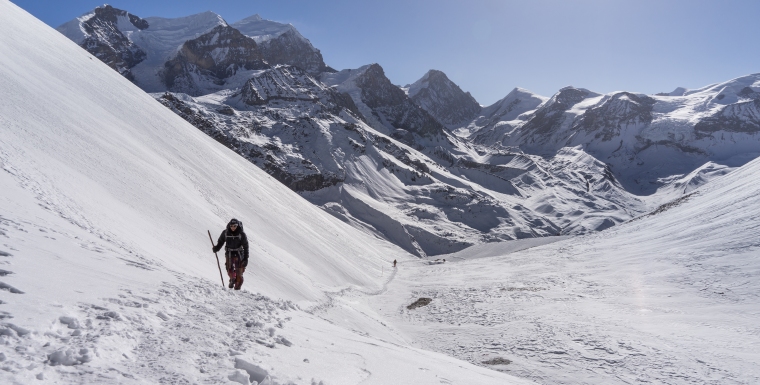
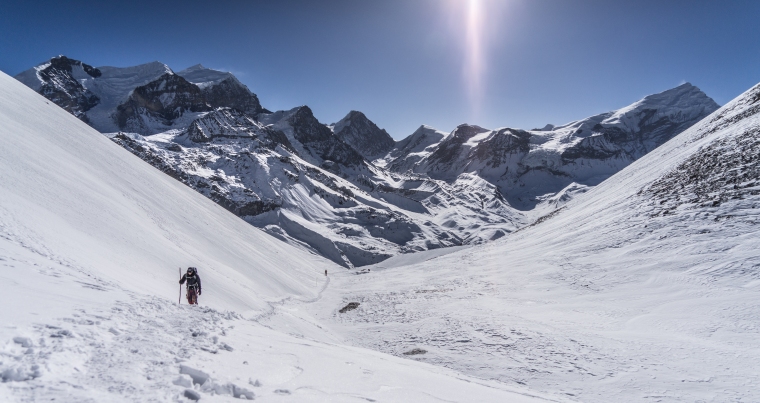
The Australian dropped his pack by the abandoned shelter (a rock structure with no door or windows made solely for severe weather conditions such as the big 2014 accident that killed 21 trekkers) and sat atop it. He broke out a pack of cookies and passed them around. I was hungry; I hadn’t eaten at all that morning (another symptom of altitude sickness, loss of appetite). When he handed me the cookie, I remembered that I hadn’t eaten and that I was, in fact, hungry. But I was reluctant to bring the cookie to my mouth; something felt off.
THE BARREN WHITENESS THAT LAY BEFORE
I kept the cookie in my hand and told the guys that I was going to start moving again. They nodded me on and wished me luck. I took a few paces before remembering the cookie in my hand. I raised the cookie to my mouth, and as soon as it reached my tongue, things went wrong, very wrong. My stomach cringed and tightened; I felt a pull in my throat as if I were going to vomit, and my vision caved in before me. I immediately fell to my knees, and the cookie fell to my side. I remained on my knees for a good while before hearing their voices. I heard them but didn’t process them. I just stared out to the white vastness that laid before me.
“What have I done?” I whispered as I clenched my fists tightly; I continued staring out to the drifts of snow, wavering on my knees.
The American came to my side: “Hey, man, are you okay?” he asked. Once again, I heard his voice but didn’t fully process it; my thoughts and fears had fully consumed me. I slowly turned my head toward him and finally spoke: “Yeah, man, I think I’m going to rest here for a while.” He looked at me and slowly shook his head before saying: “Okay, but there is a sherpa not far behind. I can wait with you, and we can call for a helicopter. You look terrible, bro.”
I acknowledged him but told him that that was not necessary. “You guys go on ahead, I’ll catch up soon. I’ll be okay.” The words that slipped from my tongue were cunning and misleading. I wasn’t fine; I was in the worst shape that I had ever experienced. My body was failing me, and not even I could muster the strength to stop it.
“If my time were truly before me, it wouldn’t be in a helicopter,” I voiced in my head. I remained on my knees, thought long and hard, and waited for my breath and vision to come back. Before I regained my stature, I made a bargain with myself. I was in a position with limited options but already knew my choice. I could have either gone back down to Thorung High Camp in the hope that I could still recover from the height of altitude sickness that I had reached or conquered the Pass that sat only a hundred vertical meters from me and be done with it. If the Long Sleep had come for me, I was going to finish what I had set out to do, summit Annapurna’s Thorung La Pass, before it took me.
I felt a meager might crawl back into my bones. I didn’t bother or have the energy for that matter, to strap my pack, so I pressed on without doing so. My feet lifted one by one and landed only a few centimeters in front of the last. I didn’t think; I just kept moving forward and up. Whiteness consumed me, and I felt like I was floating, but could still feel the tightness in my lungs, the pounding in my head, the pull in the back of my throat, and the loss of feeling in my toes. The Australian and the American weren’t far ahead, and it appeared as though I was gaining on them, but I didn’t acknowledge them, I just kept moving, at all costs. Not even the shortness of breath stopped me; every step churned forward like metal gears hard at work.
I passed them. I did not look back, though. Instead, I heard the words: “Right on, bro. Go!” It was the voice of the American, which I could recognize from anywhere. My fist raised to the sky and fell alongside my next step. I continued. Every stretch of ground that I covered looked the same as the last and every mound of rock and snow led to another. But I kept digging my feet, one by one, after another, into the snow.
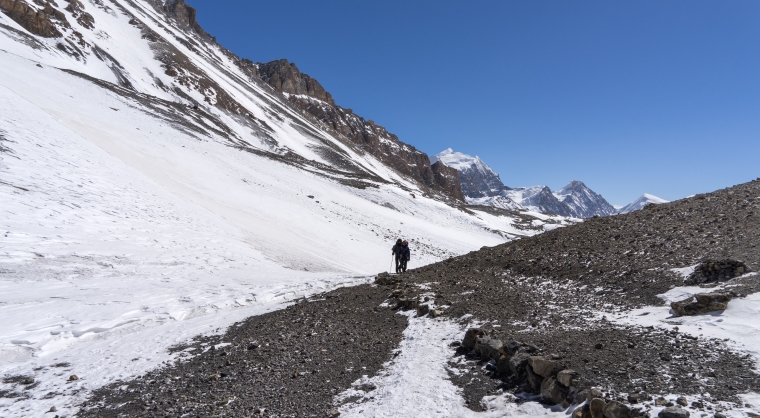
THE PASS
I had made much ground since I had last fallen to my knees. Up over the last ridge, I could see The Bear and the Italian standing proud and strong. Behind them, were colorful Tibetan Prayer Flags, blowing in the wind against the pale blue sky. They were standing at the summit of the Pass. More energy crept into my veins as I picked up my pace and hastened toward them. The Australian and the American were only a few paces behind, but I could hear them yell in excitement. The horizon shifted lower and lower as I gained ground until I had met the pile of rocks marking the summit. A teahouse also marked the summit, and there was a caretaker, well, taking care. I reached them and was astounded by how; I couldn’t remember any of the last bit of distance I had come. I just knew that I was standing at the highest point that I had ever stood and was graced with the opportunity to drop over 1,700 meters. My chances of living doubled at that moment. I knew if I fell far and fast enough, my symptoms would lessen and dissipate immediately—if it wasn’t too late, that was.


LIFE
At the summit, I grabbed a hot black tea and pondered in our victory. I shared a few words of accomplishment with The Bear and the Italian, but I didn’t stay for long; my symptoms lingered on and hovered dreadfully over me. After my tea was halfway finished, I left it in the comforts of the teahouse and started my long descent to Muktinath. The Italian and The Bear led the way, but I soon passed them as my walking turned into a jog and, eventually, an all out sprint down the snowy banks of Thorung La.
I felt life jolt back into me, and my legs as they shook off the weariness that had taken them. It was me, strong and lively. I was back, and my soul burned with a fiery life. When the trail got too steep to run, I ran; I ran and jumped onto the thin sheet of hard snow and glided down the rock walls. I slid for hundreds of meters at a time, hitting lumpy rocks along the way. But I was living in the very sense of living. I leaned heavily on my skills as I traversed the icy path on my knees and shoulder. I let out howls and pushed the limits of what I knew my body was capable of. I took back what was taken from me and showed it off every meter. I drove my poles into the ice and steered my way south toward my first village. By the time I looked back, I couldn’t see anybody. I was so far ahead that it would take hours for them to eventually find me sitting, showered, wearing jeans and a t-shirt, enjoying a hot coffee, at the Bob Marley Inn.

MUKTINATH
I arrived at Muktinath well before noon and was the only fresh trekker around. I checked into the Inn, having heard of it from various people as a meeting point for celebration. I picked a room that sat on the top terrace and looked out to the Annapurna Range. I relished in a hot shower and scrubbed the skin clean of dirt and dead skin. It was the first shower I had had since I started trekking the Annapurna Range—it was glorifying. After a hot shower and a clean pair of clothes, I poured a fresh cup of organic Himalayan coffee. The mug was huge and filled the entire palm of my hand…and some. The coffee tasted so fresh as it bit down on my taste buds. The sun shone brightly above, and not a single cloud filled the sky. I had just come from the icy depths of Thorung La and was now sitting in a barren, desert land that was invulnerable to the threat of snow and ice.
One by one, other trekkers showed up—hours after I had gotten comfortable. They looked at my clean clothes and the fresh cup of coffee and smiled. The afternoon went on like this for some time. Trekkers poured in by the pair. More people than I expected forged ahead and took on the Pass that day. But far less than the number who had first set out to do so. A small fraction of who set out to tame Thorung La made it to Muktinath that day (some having been medivaced off of the mountain), and that evening we celebrated. We celebrated with bottles of vodka, liters of coffee, searing hot plates of food, and music; Bob himself would’ve been pleased.
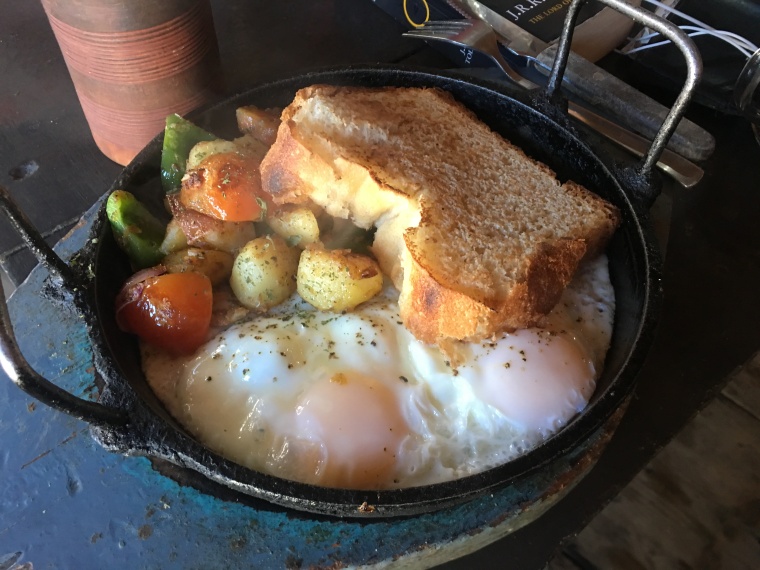
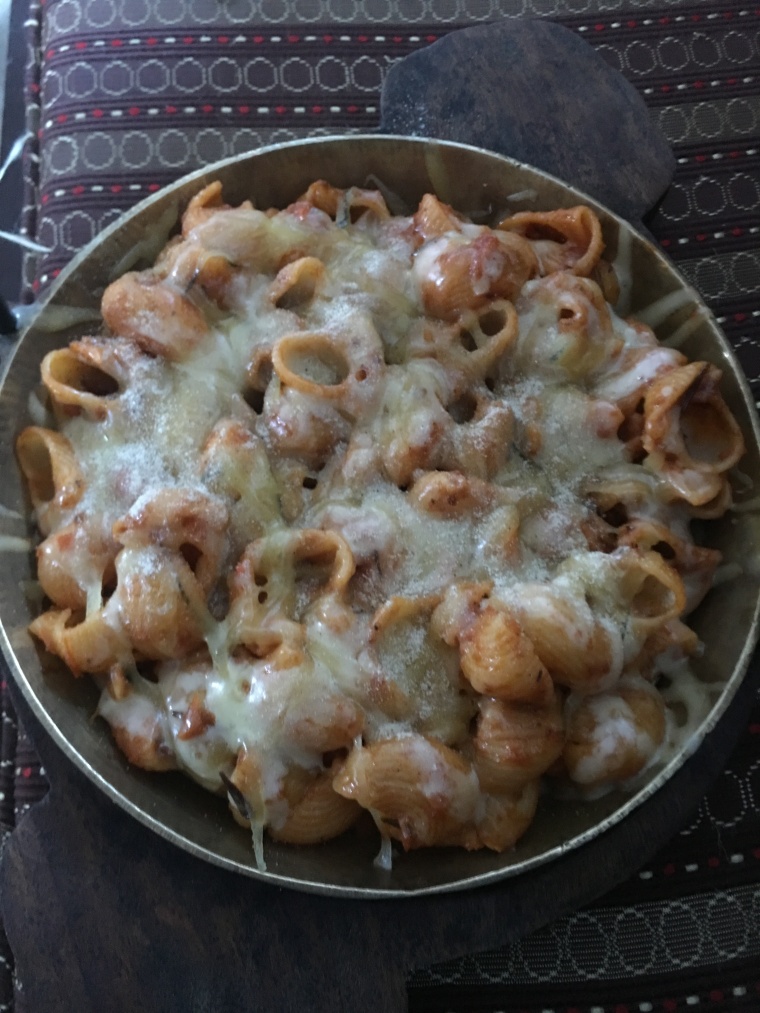
Small fires roared amidst the merry voices as cool temperatures settled in outside the doors. People laughed, genuine laughs that only somebody who had overcome great adversity could laugh. Lifelong friendships emerged as we had all shared a great deal of difficulties with one another.
I spent time with trekkers I hadn’t seen for many days and, of course, the Australian and the American. They were amazed at the person I actually was—not the person I had become, the person they had seen faltering in the icy tundra of Thorung La. It was like age had been wiped from my face and energy of new youth had radiated from my skin. I, too, could feel and see it. I was me again and wore a smile the entire evening. The Australian’s smile, on the other hand, went along with that night’s dinner; too much vodka, you see. No real harm, though, just memories of hanging off of the balcony pouring out his guts (his smile came back that morning at the sight of breakfast).
Among the many people crowding the Inn, we were all tied into one another through mutual friends; It was like a family reunion. Two other trekkers worth mentioning were two American friends, Jesse and Chris. I had faced great misery and great triumph with them the days before the Pass but hadn’t seen them since the village of Manang. Somewhere along the desperate search for a place to sleep, we lost each other. But I found them sitting, laughing, with broad smiles painted long across their faces, by a warmly lit fire. When our stares crossed, it was like reuniting with a long lost friend who I had thought to be long gone. We spent most of the evening together sharing the missing stories of our time apart until the evening faded and we all retired to our quarters for a well-earned night’s sleep.



The end
